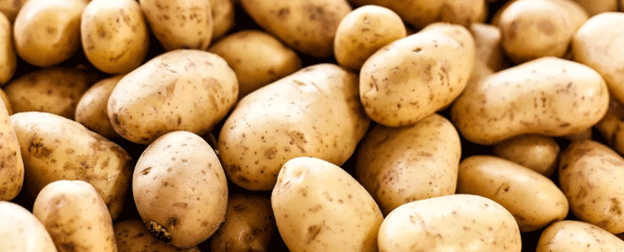Potato sprouting is more than just a kitchen nuisance—it’s a serious issue for farmers, retailers, and food processors who rely on long-term storage of this staple crop. Sprouting not only reduces the visual and nutritional quality of potatoes, but it also leads to weight loss, shriveling, and in some cases, the buildup of toxic glycoalkaloids like solanine.
Now, a simple yet effective postharvest hack is gaining attention: store potatoes with an apple to help prevent sprouting.
This method, recently shared by lifestyle influencer Chantel Mila (Mama Mila), is rooted in actual postharvest science. Apples emit ethylene gas, a naturally occurring plant hormone that influences ripening and sprouting in various fruits and vegetables. While ethylene typically accelerates ripening in produce like bananas or avocados, in potatoes, scientific research shows the opposite effect.
A 2016 study published in the Journal of Food Science and Technology found that when ethylene gas was applied in controlled cold storage, sprouting in potatoes was significantly suppressed. The study observed that ethylene inhibited the growth of sprout meristems—essentially keeping the potatoes in dormancy longer.
Dr. Sastry Jayanty, a postharvest physiologist at Colorado State University’s Potato Program, confirms this finding. In interviews with media outlets such as AllRecipes, he recommends keeping potatoes in cool (7–10°C), dark, and well-ventilated conditions. The addition of an ethylene-producing fruit like an apple might complement such conditions in small-scale or household settings.
It’s important to note, however, that ethylene treatment is not a universal fix. Its success depends on the potato variety, storage environment, and dosage. Large-scale potato storage facilities often use chlorpropham (CIPC) or 1,4-DMN (1,4-dimethylnaphthalene) as chemical sprout inhibitors, though regulatory restrictions and consumer preferences are pushing the industry toward natural alternatives like essential oils, ethylene, and improved ventilation systems.
In contrast, for smallholder farmers, retailers, or even home gardeners, placing a single apple among stored potatoes could be a practical, chemical-free method to reduce sprouting. That said, caution should be taken:
- Apples should be fresh, not overly ripe (which could lead to overproduction of ethylene and spoilage).
- Avoid storing potatoes with onions, which release moisture and gases that accelerate spoilage.
- Use paper or breathable bags, never airtight plastic, to prevent condensation and rot.
- Keep potatoes out of sunlight, which causes greening and glycoalkaloid buildup.
As postharvest losses continue to challenge the global potato supply chain—especially in warm or poorly ventilated environments—practical, science-backed storage tips like using ethylene from apples can make a real difference. While not a replacement for professional storage infrastructure, this trick offers a low-tech, cost-effective tool for extending potato shelf life across the supply chain—from field to pantry.







